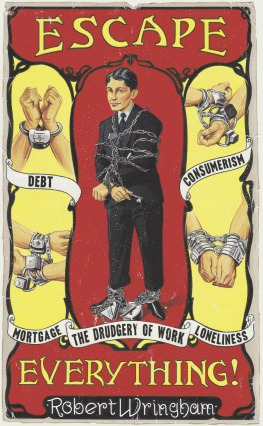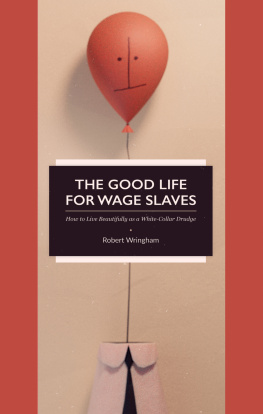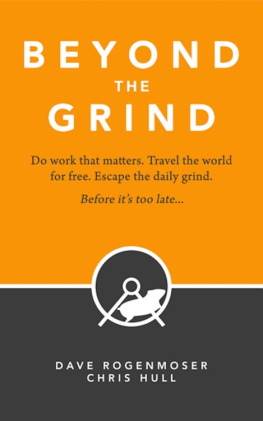
Dear Reader,
The book you are holding came about in a rather different way to most others. It was funded directly by readers through a new website: Unbound.
Unbound is the creation of three writers. We started the company because we believed there had to be a better deal for both writers and readers. On the Unbound website, authors share the ideas for the books they want to write directly with readers. If enough of you support the book by pledging for it in advance, we produce a beautifully bound special subscribers edition and distribute a regular edition and e-book wherever books are sold, in shops and online.
This new way of publishing is actually a very old idea (Samuel Johnson funded his dictionary this way). Were just using the internet to build each writer a network of patrons. Here, at the back of this book, youll find the names of all the people who made it happen.
Publishing in this way means readers are no longer just passive consumers of the books they buy, and authors are free to write the books they really want. They get a much fairer return too half the profits their books generate, rather than a tiny percentage of the cover price.
If youre not yet a subscriber, we hope that youll want to join our publishing revolution and have your name listed in one of our books in the future. To get you started, here is a 5 discount on your first pledge. Just visit unbound.com, make your pledge and type THEDAILYGRIND in the promo code box when you check out.
Thank you for your support,

Dan, Justin and John
Founders, Unbound
For Samara
All my mind is filled with a single thought: to get free!
Get free! And the intoxication of that freedom,
that success, is sublime.
Houdini
Contents
by DAVID CAIN
Every time I write a piece advocating escape from corporate servitude, I receive a few emails that contain a particular kind of scolding. They tell me that only an entitled brat could be dissatisfied with a stable job and a roof when so many pine for only these things.
If thats the case, then we live in a world built of, and for, legions of such entitled brats, whether they choose to actually implement their escape plan, or only think about it all day. For all the financial prosperity of the modern world, theres a certain poverty in our willingness to take pay to perform activities that have, typically, almost nothing to do with our personal values. As if there were no better ideas out there, we take up this yoke by the thousand, slotting ourselves into grids of grey squares, stacked 50 to a 100 high, sealed with a shiny glass exterior.
Even while the internet and its emerging cultures continue to hint at new modes of working and living, you may still be told its vain to insist on a station more fulfilling than a permanent stall in a well-reputed grid. According to my critics, even if you find your standard weekday boring, painful or unfulfilling, you ought to embrace it, simply because a third-world coal miner would kill for your benefits package. When so many have so little, attempting to escape a situation in which you can reliably feed yourself and fund a retirement, could only be an act of the utmost ingratitude.
A minority of us believe the opposite is true: that escaping from an unfulfilling mainstream lifestyle isnt a moral failing, but rather a moral imperative. Its precisely because we have the necessary freedoms at our fingertips (and because others dont) that spending our lives in the stable isnt just foolish, but wrong. To remain, voluntarily, in a life where your talents are wasted and your weekdays are obstacles, is to be humble in all the wrong ways.
Robert Wringham, along with New Escapologists readers and contributors, has come to represent to me this sensible minority. If youre reading this book, its nearly certain that youre living with levels of potential freedom that nearly all of historys humans would envy, and that alone is reason enough to feel uneasy if you havent yet made good on this gift.
The desire to escape corporate policy, consumer debt, meaningless work, or any other life-draining first-world cultural norm is not a symptom of greed. Rather, its a reaction to a truth we dont like to talk about in the office: that, given our options, were probably not using our lives very well. There may be, in any given tract of cubicles, that rare round peg, whose values exactly match those outlined in his companys policy manual and mission statement, and for whom his years truly are best spent doing what his underboss would like him to do. But the truth is that most of us simply by following the path prescribed by our schools, bosses and peers end up entrenched in a set of roles that do not serve our deepest values and which, in the early hours of any given Monday, we do not especially look forward to fulfilling.
Still, were liable to feel ambivalence whenever we think about deviating from norms of any kind. This affliction, which we might call rebels doubt, may put us in danger of taking seriously the charges of selfishness and insularity we get from those who embrace the mainstream. Check your privilege! they sneer, with latte in hand.
But with a bit of thought we can see that the failure of empathy is on their side. As our impoverished coal miner knows, only a fool would submit to living a single day as a peon when he has the means to escape in his back pocket. Limiting your freedom in some kind of token solidarity with the truly oppressed is like avoiding exceptional health simply because the chronically ill cant have it. Im convinced now that a calculated escape from the status quo is an aspiration to a particular kind of health, which is only now beginning to catch on: a thoughtful, prosperous alignment of your values and your lifestyle.
In a world where such a thing is possible, you might think wed all be trying on lifestyles until we found one that fitted. But relatively few do. As it stands, the norm is to pick a popular one, perhaps fully aware that The Man himself is at the helm, and run with it for several decades, even well after its ultimate irrelevance and emptiness begin to show. Meanwhile, we complain fondly about it, make knowing jokes with our colleagues about it, steal pens and toner to reclaim some of our lost self-esteem, and if were lucky, become at least numb to the work itself. What makes it seem worthwhile is that the proceeds allow us to build, in our evenings and on weekends, a fraction of the life we wanted all along.
Why is this kind of needless languishing still such a dominant tradition? At least partly, its because were told from childhood the celebrated lie that quitters never win. Again, only a little thought is necessary in order to see the holes here: condemning egress in general implies that nothing should ever be abandoned once its entered, whether its a deadening career, a dead relationship, or for that matter, a burning building.
Using New Escapologist as a lens, Robert has shown us the enormous misuse of human energy that is this status quo, as well as what can flourish in ordinary people when that energy is reclaimed and repurposed. Human beings, it turns out, are most prone to creating original and valuable things when they








